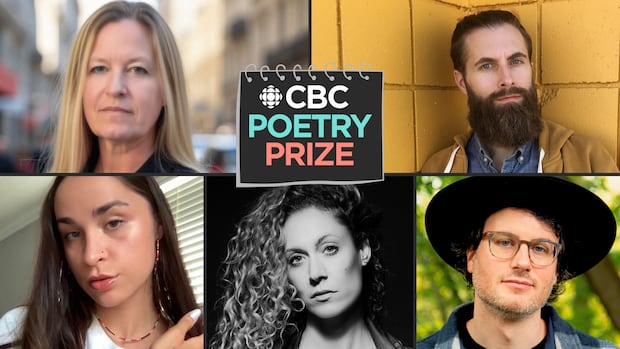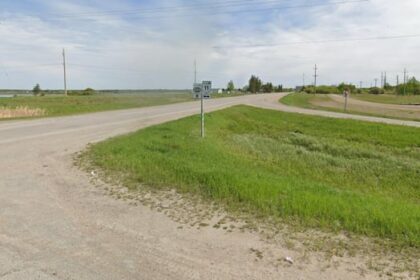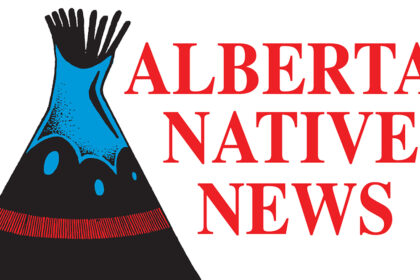Jennifer Manuel, Brad Aaron Modlin, Jordan Redekop-Jones, Carly Straker and Jan A. Wozniak have made the 2025 CBC Poetry Prize shortlist.Their nominated works are: Hold for the Next Available Me by Jennifer Manuel (Duncan, B.C.)Mice, Toads, Peacocks by Brad Aaron Modlin (Montreal)Mixed Girl as Cosmogonic Myth by Jordan Redekop-Jones (Vancouver)Northern Girls by Carly Straker (Yellowknife)Memory Palace of the One-Track Oracle by Jan A. Wozniak (Toronto)The winner will be announced on Nov. 19. They will receive $6,000 from the Canada Council for the Arts and a two-week writing residency at Banff Centre for Arts and Creativity.CBC Literary Prize winners get a writing residency — Chanel M. Sutherland shares how it’s life-changingThe remaining four finalists will each receive $1,000 from the Canada Council for the Arts.All five finalists had their work published on CBC Books. You can read their stories by clicking on the links above.7 ways winning a CBC Literary Prize will change your lifeThe longlist was selected from more than 3,200 submissions. Submissions are processed by a two-tiered system: the initial submissions are screened by a reading committee chosen for each category from a group of qualified editors and writers across the country. Each entry is read by two readers.The readers come up with a preliminary list of approximately 100 submissions that are then forwarded to a second reading committee. It is this committee who will decide upon the approximately 30 entries that comprise the longlist that is forwarded to the jury.Meet the 2025 CBC Poetry Prize readersThis year’s finalists were selected by a jury composed of Carol Rose GoldenEagle, Paul Vermeersch and Britta B. They will also select the winner.Works are judged anonymously on the basis of the participant’s use of language, originality of subject and writing style. For more on how the judging for the CBC Literary Prizes works, visit the FAQ page.The shortlist for the French-language competition has also been revealed. To read more, go to the Prix de la création Radio-Canada.Last year’s winner was Rachel Robb for her poem Palimpsest County. You can read the entire 2024 shortlist here.Rachel Robb explores what reconciliation means to a non-Indigenous person and wins 2024 CBC Poetry PrizeIf you’re interested in the CBC Literary Prizes, the 2026 CBC Nonfiction Prize opens in January and the 2026 CBC Poetry Prize will open in April.Get to know the 2025 CBC Poetry Prize English-language finalists below.Hold for the Next Available Me by Jennifer ManuelHold for the Next Available Me by Jennifer Manuel is on the 2025 CBC Poetry Prize shortlist. (Katie Carey/CBC)Jennifer Manuel is the author of the debut novel The Heaviness of Things That Float, which won the Ethel Wilson Prize for Fiction, and the literary novel The Morning Bell Brings the Broken Hearted. She has also published two children’s novels, Head to Head — a Red Cedar Award finalist — and Dressed to Play, as well as the YA novel Open Secrets.Jennifer Manuel on a nurse’s struggle to belong to a First Nations communityHer work explores empathy, resilience and the quiet complexities of human connection. Manuel teaches literature at Shawnigan Lake School on Vancouver Island, where she helps emerging writers in finding precision and heart in their craft.B.C. author challenges Canadians to sign up for TRC reading challengeWhy she wrote Hold for the Next Available Me: “The poem started after I read about voice actors whose recordings were being used to train AI. What happens to all those human traces we leave behind — the pauses, the hesitations, that breath you hear between sentences? It turned into this reflection on voice as both labour and inheritance. There’s something unsettling, almost intimate, about hearing yourself transformed into something tireless and bodiless, just endlessly available. But when I dig down to what it’s truly about, beneath all the technology, it’s a grief poem. It’s about the pieces of ourselves we give away just to be heard, and everything that disappears in the process. There’s something unsettling, almost intimate, about hearing yourself transformed into something tireless and bodiless, just endlessly available.- Jennifer Manuel”I wanted to test whether a poem about contemporary technology — specifically AI and voice actors — could find a wide audience. The CBC felt like the right venue: a place where poetry about current issues can still maintain its literary quality. I was curious if a poem about something as specific as voice actors training AI could connect with readers who might have considered these questions before — whether the technical could also be poetic.”Read Hold for the Next Available MeMice, Toads, Peacocks by Brad Aaron ModlinMice, Toads, Peacocks by Brad Aaron Modlin is on the 2025 CBC Poetry Prize shortlist. (Katie Carey/CBC)Brad Aaron Modlin is a creative writing professor. His poetry book Everyone at This Party Has Two Names is available from Black Lawrence Press. He writes fiction about dead people more like us than we’d guess. His work has appeared in the Pushcart Prize, New Ohio Review, River Styx, Brevity and CBC. Also orchestral scores, Australian art galleries, Brooklyn public art, the podcasts Poetry Unbound & The Slowdown, and his neighbour’s refrigerator. When overwhelmed, he dances. Once small talk is over, he asks a new person what made them happy this week. Modlin was also longlisted for two other poems: On a Misty Morning by the Saint Lawrence Beside Potted Pink, Purple, & Yellow Flowers, I Think of How Much I’ve Complained This Month Alone and When I Introduce My Friend, I Proudly Say, “This Is Peter, He Doesn’t Have an Esophagus.”In 2022, Modlin was longlisted for the CBC Poetry Prize for Pink Fairy Armadillo and shortlisted for To the Astronaut Who Hopes Life on Another Planet Will Be More Bearable. He was also longlisted for the 2023 CBC Poetry Prize for This Story Ends with Nothing Quite Landing on Us.Why he wrote Mice, Toads, Peacocks: “The unforgettable art I saw with my significant other. Despite my foibles and our un-belonging-ness, the wood carvings said we — everyone — were supposed to be exactly here.” I share my work to connect with others, to talk to strangers.- Brad Aaron Modlin”I’m quite extroverted for a poet. We write alone, hoping the blackbird will fly to readers. I share my work to connect with others, to talk to strangers. Because people frequently write to tell me what my work means to them, I keep writing more. I want to offer companionship. No, you are not — nor am I — the only one! “Also, it’s been a pleasure to work with the CBC Poetry Prize before, having longlisted thrice and shortlisted once before.”Read Mice, Toads, PeacocksMixed Girl as Cosmogonic Myth by Jordan Redekop-JonesMixed Girl as Cosmogonic Myth by Jordan Redekop-Jones is on the 2025 CBC Poetry Prize shortlist. (Katie Carey/CBC)Jordan Redekop-Jones is a mixed Indigenous/Anglo-Indian writer from Vancouver. She is the winner of the 2024 Austin Clarke Prize in Literary Excellence for Poetry and was a recipient of a 2024 Indigenous Voices Award in the unpublished poetry category. Her work has appeared in Prism International, Arc Poetry, The Ex-Puritan, SAD Mag, Rungh and elsewhere. She is a graduate of Simon Fraser University’s The Writer’s Studio and is currently doing her MA in English literature at Simon Fraser University.Why she wrote Mixed Girl as Cosmogonic Myth: “Becoming a caregiver in my 20s while in the midst of reconnecting to my cultures as someone who is both mixed and displaced has been both challenging and profoundly enlightening.”Memory is something that fascinates me. I am an incredibly nostalgic person which has only been amplified through the lens of watching someone I deeply love be affected by progressive illness. The grief I have experienced during this time has both sharply and softly embedded me in a liminal space. Like the title of my piece, I at times feel like a myth. A mixed girl among the stars and planets trying to find a place to call home. This poem is an ode to my journey and is dedicated to the strongest, most beautiful woman I know; my mother.- Jordan Redekop-Jones”Above all, this poem is an ode to my journey and is dedicated to the strongest, most beautiful woman I know; my mother.””I wanted to share my work with CBC because I felt that it was time to tell my story. Over the past few years, I have begun to open up more about my cultural experience. Reconnection is a process with a lot of ebbs and flows and can at times be very isolating. That is why I think it is always important to talk about it as honestly and openly as possible. While the elements of progressive illness have been frequently embedded in my work, I don’t often talk about the ways in which it has affected my life. I hope this piece grounds readers in the experience in a way that opens up more of a conversation on memory, progressive illness, healing and kinship.”Read Mixed Girl as Cosmogonic MythNorthern Girls by Carly StrakerNorthern Girls by Carly Straker is on the 2025 CBC Poetry Prize shortlist. (Katie Carey/CBC)Carly Straker has been writing since she was a young child, but Things The Trees Taught Me is her debut published poetry collection. She currently lives in Yellowknife, where she was born and raised, and first discovered the magic of what it was to hold a pencil in her hand and know the sacred connection to the water and the woods that so deeply feel like home. She is the mother of a little girl who is sunlight in her life and the place from which so much of her art and wonder flows. Her creative works often touch on love, sorrow, femininity and nature.Why she wrote Northern Girls: “This poetry was inspired by loss, immense layerings of grief, and the experience of time passing where sorrow and joy coexist in the everyday moments of life. It was inspired by the experience of returning to oneself and the world after tending to deep wounds and by the act of noticing the depth of the connections we hold with ourselves, with others, with place and with the earth and its creatures. [This poetry] was inspired by the experience of holding many things at once.- Carly Straker”It was inspired by gratitude, love, this journey of becoming, and the ways beauty and delight are sometimes strange and unexpected companions to the aching. It was inspired by the experience of holding many things at once.””Sharing my work means leaning into bravery. Putting something out into the world with the hope that others connect to words and sentiments that can at times be hard to name or identify.”Read Northern GirlsMemory Palace of the One-Track Oracle by Jan A. WozniakMemory Palace of the One-Track Oracle by Jan A. Wozniak is on the 2025 CBC Poetry Prize shortlist. (Katie Carey/CBC)Jan A. Wozniak is an autistic writer, disability advocate, therapist and clinical scholar based in Toronto. He is currently completing his Master of Social Work at the Factor-Inwentash School of Social Work at the University of Toronto and serves as a Program Engagement Co-Facilitator and Researcher at the Azrieli Adult Neurodevelopmental Centre (CAMH). Prior to this, Jan completed undergraduate and graduate studies at Toronto Metropolitan University. His works have been published in a number of academic and literary journals, including Autism, Autism in Adulthood, Intersect, JIRIRI, Ought, Spectrum and the Canadian Journal of Autism Equity, among others.Why he wrote Memory Palace of the One-Track Oracle: “I chose to share Memory Palace of the One-Track Oracle to expand the conversation around autism and neurodiversity beyond clinical and diagnostic frameworks. “Unfortunately, stereotypes about autism are still rampant within today’s society, with some rather public figures claiming autistic individuals cannot complete or perform particular tasks, poetry among them. Hollywood and the media often produce and reinforce problematic narratives of autism by flattening the complexity of their experiences, often through harmful caricatures like the tragic savant, the emotionless genius, or the family burden. I wanted this poem to stand as a counter-narrative, serving as a space where autistic perception could speak for itself.- Jan A. Wozniak”I wanted this poem to stand as a counter-narrative, serving as a space where autistic perception could speak for itself in its own unique, unabashed ways. In this regard, sharing the poem also feels like it’s completing its circuit. So much of it arose from solitude. Therefore, to share it publicly is to transform that isolation into connection as an offering of attention, an open file left running in the hope that someone else recognizes themselves in its codes and patterns. “If the poem reaches even one reader who feels seen, or helps someone to reflect or reconsider what neurodiversity means, then the transmission has fulfilled its purpose.Read Memory Palace of the One-Track Oracle
2 B.C. writers make the 2025 CBC Poetry Prize shortlist











